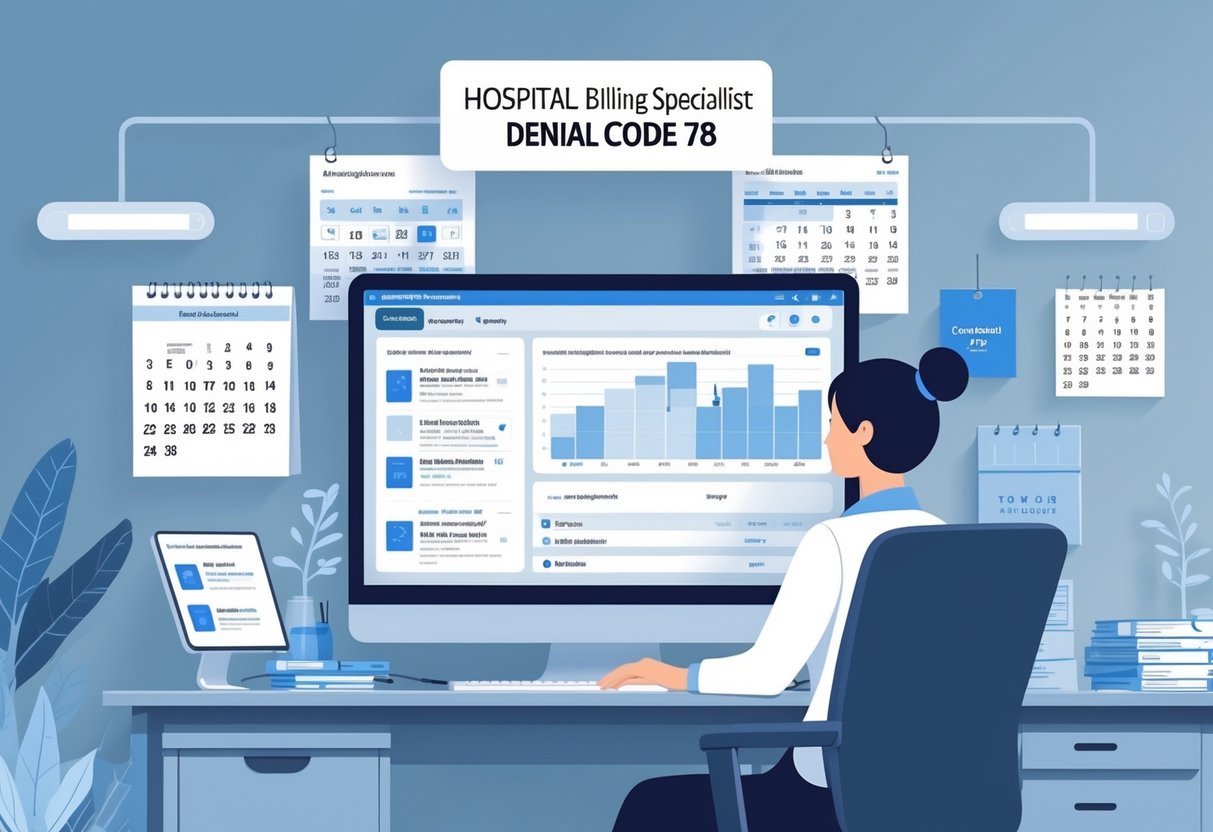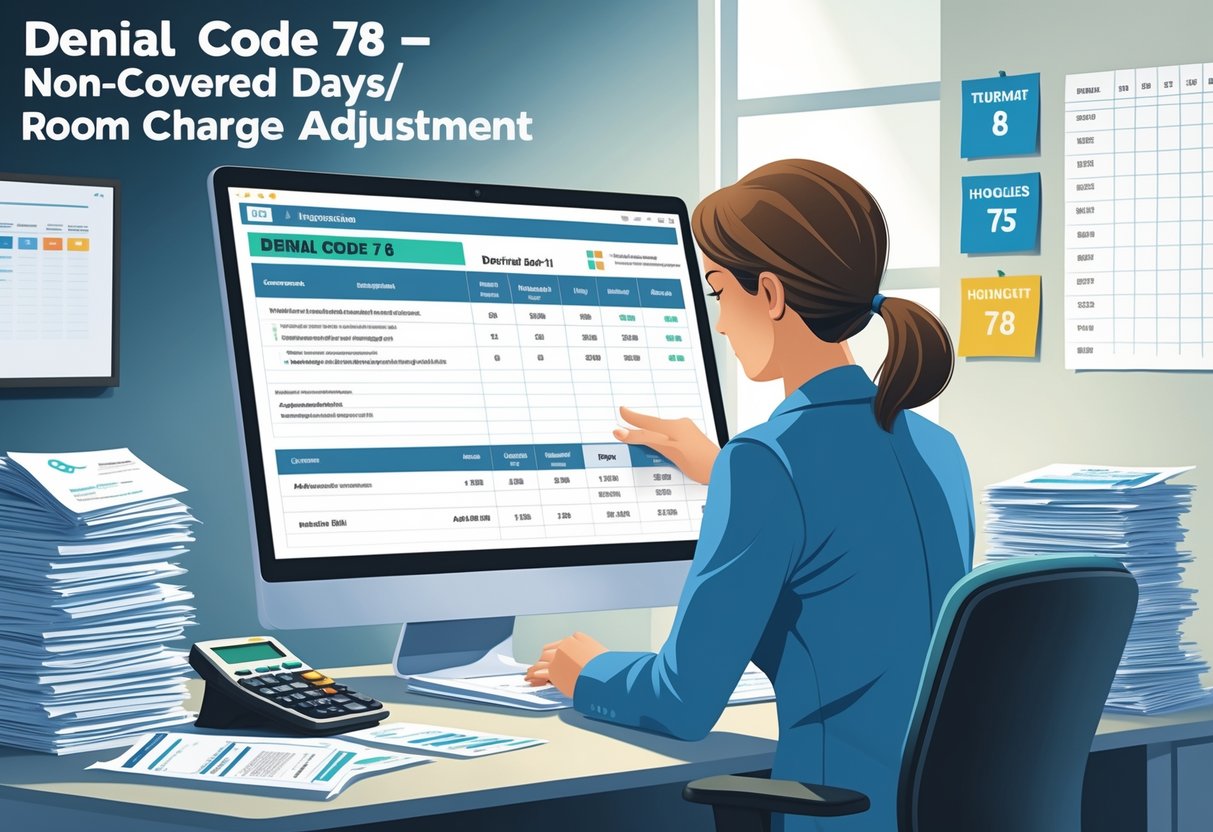If you’ve seen the denial code 78 on a medical bill, it means the insurance company is rejecting charges for days they consider non-covered or adjusting room charges. This denial happens because the payer believes some days of your hospital stay don’t meet coverage rules or should be billed differently.
Understanding why these days are labeled non-covered can help you avoid billing mistakes and speed up payment. You might need to check if prior authorization was required or if the services during those days match the insurance policy terms.
Knowing exactly what triggers denial code 78 can save you time and money. This article will break down how to handle these denials and what you can do to correct or appeal them.
Understanding Denial Code 78

Denial Code 78 relates specifically to charges that payers classify as non-covered or adjustments to room charges. You will find this code appear when services or days stay outside a payer’s allowed benefits or contract terms. Understanding what triggers this code helps you manage billing and appeals more effectively.
Definition and Core Meaning
Denial Code 78 means that certain days of care or room charges on a claim are not covered by the insurance plan. This usually happens when your patient’s hospital stay goes beyond what the payer approves. The insurer adjusts the payment by removing those non-covered days or charges.
This denial code tells you that part of the billed service isn’t payable under the patient’s policy. It is not necessarily a mistake, but a plan limitation. Your role is to identify which days or charges the payer rejected and why.
When Denial Code 78 Is Used
You will see Denial Code 78 used when an insurer finds that some days of inpatient or outpatient care are not eligible for payment. This often happens if the length of stay exceeds the maximum allowed for a specific diagnosis or procedure.
The code also applies if the room charges exceed benefit limits or if the insurer’s review finds the stay was not medically necessary for certain days. The payer adjusts the claim by removing payment for those days or reducing the room charges.
This denial requires you to check the patient’s coverage details and the insurer’s policy on length of stay and room charges. It may need further documentation or appeals if the denial seems incorrect.
Industry Standards and Payers Involved
Denial Code 78 is used widely across Medicare, Medicaid, and many private insurers. Medicare often issues this code when inpatient days go beyond the approved length of stay after a review or discharge planning.
Private payers have similar rules but the specifics of coverage limits can vary. Some insurers have strict policies on room rates and length of stay, while others allow more flexibility.
You must review the payer’s guidelines and contracts carefully. Knowing each payer’s rules helps you prevent denials or prepare strong appeals when you receive Denial Code 78.
Causes for Non-Covered Days and Room Charge Adjustment

You may face denial code 78 when certain days or room charges are not covered by insurance. This can happen for various reasons, including issues with how care fits coverage rules, mistakes in paperwork, or specific patient situations. Understanding these causes helps you avoid denials and manage claims better.
Common Scenarios Leading to Denial Code 78
Denial code 78 often occurs when the patient stays beyond the covered period set by the payer. For example, insurance might pay only for acute care days, while extended stays for rehabilitation or custodial care are not covered.
Another common cause is when the patient is admitted for a service excluded from coverage. If your patient’s stay involves a non-covered procedure or is related to a condition the insurer does not pay for, the charges can be denied.
Insurance policies also reject charges if the admission type does not match coverage terms. For example, outpatient care billed as inpatient can trigger denial code 78.
Medical Necessity and Coverage Criteria
Insurers require that every day of inpatient care meets medical necessity standards. If your documentation does not show the patient’s condition justifies a hospital stay each day, coverage may be denied.
Coverage criteria can vary by insurer, so it’s important to know payer rules. For example, some insurers require specific tests or treatments to prove medical necessity for continued hospitalization.
If your patient’s care shifts to a lower level, such as skilled nursing or long-term care, days beyond the acute care period might not be covered.
Documentation Errors and Omissions
Incomplete or incorrect documentation is a key cause of denial code 78. If your medical records lack details about daily care needs, insurers may reject the claim.
Missing physician orders or progress notes that explain why the patient stayed in the hospital can lead to denials.
Billing the wrong room type or failing to update records when the patient changes care levels can cause room charge adjustments and denials.
Always double-check that your documentation fully supports the need for every billed day and room charge.
Impact on Medical Billing and Reimbursement
Denial code 78 affects how you handle billing and payment for hospital stays. It requires careful review of patient days and room charges to avoid missed payments or incorrect bills. Addressing this denial properly protects your revenue and keeps patient charges accurate.
Financial Consequences for Providers
You face reduced payments when charges for non-covered days or improper room charges are denied. This can lead to lost revenue if you don’t adjust claims correctly before resubmitting. Tracking denied days carefully helps you avoid writing off more costs than necessary.
If you submit claims with incorrect room charges, insurers may reject those charges, forcing you to appeal or adjust the billing. This increases administrative work and slows down reimbursement. Clear documentation of medically necessary days and proper room types is essential to minimize denials.
Patient Billing Implications
If the insurer denies coverage for certain days or room charges, those costs might be billed to you. This can surprise patients with unexpected out-of-pocket expenses. You should explain the denial to the patient clearly and provide detailed billing statements.
You also need to check whether the patient’s insurance policy covers those days or room types. Patients with limited coverage may face higher financial responsibility, so early communication helps avoid disputes and unpaid bills. Offering payment plans can ease patient financial burdens in these cases.
Strategies to Prevent and Manage Denial Code 78
To avoid Denial Code 78, focus on clear documentation, verifying coverage before services, and training your staff well. These steps can reduce errors and speed up claims approval.
Improving Documentation Practices
You need to document every service and care day clearly. Include detailed notes on why each day was necessary. This proof helps show the service is covered.
Use standard templates to ensure consistent entries. Highlight any medical reasons that justify longer stays. Also, keep records updated with the latest clinical information.
Check for gaps or unclear information regularly. Missing details can cause denials or slow down your billing process. Accurate documentation supports your claim’s validity.
Pre-Authorization and Verification Tactics
Always verify coverage before admitting a patient. Contact insurers to confirm which days or room charges they cover. This prevents billing non-covered days by mistake.
Get pre-authorization for extended stays when needed. Provide clear reasons why extra days are necessary. Having approval upfront reduces denial chances.
Keep a checklist of insurer requirements. Use it to verify details like patient eligibility, covered dates, and billing codes. Correct these before submitting claims for fewer delays.
Staff Education and Training
Train your staff on how to handle documentation and billing for covered services. They should understand Denial Code 78 and why it happens.
Use examples and role-playing to show how to avoid errors. Stress the importance of checking insurance coverage and documenting medical necessity.
Update training regularly, especially when payer rules change. Well-informed staff are key to reducing denials and improving your revenue cycle.
Appealing Denial Code 78 Decisions
When you face a denial with Code 78, acting quickly and knowing what to submit is key. You need to follow specific steps and provide the right paperwork to have the best chance at success. Timing matters, so keep track of deadlines and check on your appeal’s progress.
Steps in the Appeal Process
First, review the denial letter carefully. It will tell you why the claim was denied and how to start the appeal.
Next, write a formal appeal letter. Explain why you believe the denial was wrong. Focus on facts like covered days, medical necessity, or billing errors.
Send your appeal to the right address or portal provided by the payer. Keep copies of everything you submit.
Wait for a response. If you don’t hear back within the specified time, follow up to avoid missing deadlines.
Required Documentation for Appeals
You must include all proof that supports your appeal. This usually means:
- Medical records proving the need for each day charged.
- Doctor’s orders or discharge notes confirming the treatment period.
- A copy of the original claim and the denial notice.
- Your appeal letter clearly explaining the situation.
If you have any prior authorizations or coverage policies, adding those can help. Organize your documents clearly and label them so reviewers can easily understand your case.
Timelines and Follow-Up
Appeals have strict deadlines, often 30 to 90 days from the denial date. Check your payer’s rules immediately.
Mark your calendar with important dates like appeal submission and expected response times.
If you don’t get a reply, call the payer to ask about your appeal status.
Document all communications. Keep notes of phone calls, including dates, names, and what was discussed.
Prompt action can prevent your appeal from being automatically denied due to missed deadlines.
Frequently Asked Questions
You may need to know what denial code 78 means for your hospital bill. It affects how room charges are adjusted when certain days are not covered by insurance. This section explains what leads to this denial and how you can address it.
What is denial code 78 and how does it affect hospital room charge adjustments?
Denial code 78 means some days of your hospital stay are not covered by insurance. Because of this, the insurer reduces payment for those days. The hospital may adjust room charges based on this denial.
How can a patient or provider dispute a claim denial associated with non-covered days indicated by code 78?
You or your provider can file an appeal with the insurance company. It is important to provide supporting evidence to prove those days should be covered. Follow the insurer’s specific instructions to submit the dispute.
What are the common causes that lead to a denial under code 78 for room charge adjustments?
Common causes include insurance policy limits, lack of medical necessity for certain days, or coverage exclusions. Sometimes, paperwork errors or missing authorizations can also trigger this denial.
Can insurance coverage be retroactively applied to non-covered days resulting in denial code 78?
In some cases, retroactive coverage may be possible. This usually requires additional documentation or a change in the patient’s insurance status. Approval depends on insurer policies and circumstances.
What documentation is required to resolve a denial pertaining to code 78?
You will generally need medical records, physician notes, and insurance eligibility information. Proof of medical necessity and prior authorizations also help resolve these denials.
Is there a standard appeals process for challenging the denial of payment for hospital room charges under code 78?
Yes, most insurers have a formal appeals process. You must submit a written appeal with detailed reasons and relevant documents. Keep copies of all communications during the appeal.







